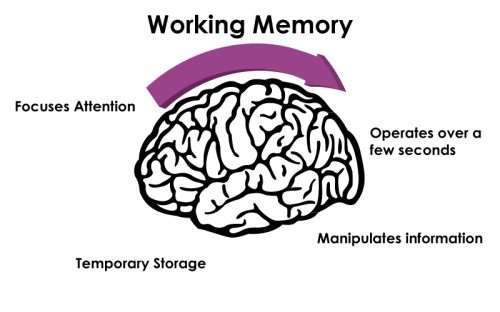Understanding how to increase memory power in children isn’t just about helping them remember school lessons — it’s about nurturing their overall mental health and confidence. By exploring how memory works and encouraging healthy habits, playful learning activities, and sensory play, parents and educators can effectively boost memory skills. Alongside professional therapies when needed, these strategies strengthen children’s working memory, attention, and learning abilities, laying a solid foundation for lifelong growth and success.
What is working memory?
Working memory is like a mental workspace where the brain temporarily stores and manipulates information. It helps children remember what the teacher just said while taking notes, or hold the first part of a question in mind while thinking about the answer.
For example:
When a teacher says, “Open your books to page 20 and solve question 3,” a child’s working memory holds this information just long enough to complete the task.
While solving a math word problem, a child keeps numbers and conditions in mind to process them step by step.
This short-term memory system isn’t about memorizing for life, but about holding information ‘online’ for seconds or minutes so it can be used immediately.

Why is working memory important?
A strong working memory directly supports:
Academic achievement: Remembering what’s taught, instructions, and classroom discussions.
Social skills: Following conversations, remembering names and details, or recalling what someone just shared.
Daily functioning: Completing multi-step routines like getting ready for school or packing a bag.
Children with weaker working memory often feel overwhelmed, lose track of tasks, or appear distracted — which can affect their child mental health, confidence, and motivation to learn.
Understanding this connection helps parents and teachers find better ways how to increase memory power in children and support their emotional well-being.

10 tips to improve memory power
If you’re looking for practical, everyday ways how to increase your memory power or your child’s, these strategies can make a real difference:
Turn information into visuals: Mind maps, colorful charts, or drawing concepts help the brain process and recall data better.
Use chunking: Break big tasks or lists into smaller, manageable parts — for example, memorize three items at a time instead of ten.
Play memory-boosting games: Activities like Memory cards, ‘Simon Says’, or recall games sharpen attention and recall skills.
Encourage verbal repetition: Ask your child to repeat instructions out loud or teach what they learned to someone else.
Establish structured routines: Predictable schedules reduce memory load, freeing mental energy for new learning.
Storytelling and visualization: Have your child create a story around facts or imagine a vivid picture related to what they want to remember.
Healthy habits: Adequate sleep, brain-healthy foods (like nuts, berries, and green leafy vegetables), and regular physical activity boost brain performance.
Mnemonic devices: Rhymes, acronyms, or songs make remembering lists and facts easier.
Practice mindfulness: Simple breathing exercises and short meditation sessions help children calm their minds, improving focus and working memory.
Use external memory aids: Checklists, planners, sticky notes, or apps reduce stress and improve task completion.
These techniques not only answer how to increase memory power but also contribute positively to your child’s mental health by reducing frustration and building success experiences.

How can we help kids with therapy for working memory issues?
Sometimes, memory difficulties are more than just a developmental stage. Children with ADHD, learning disabilities, or developmental delays may need targeted intervention to improve working memory.
Professional help may include:
Occupational Therapy (OT)
Helps children build routines, use sensory tools, and develop strategies to remember steps in tasks.
Speech and Language Therapy (SLT)
Supports kids who struggle to remember verbal information or follow complex instructions.
Cognitive Training
Specialized programs use exercises and computer-based activities to train memory and attention.
Behavioral and Educational Support
Therapists teach practical strategies like asking for repetition, writing down key points, or using reminders.
At Nurturers, we combine therapy with family guidance — because helping children is most effective when parents understand how to increase your memory power at home too.
10 Foods that Improve Memory and Focus
Nutrition plays a powerful role in brain health — especially for growing children whose brains are still developing. Including the right foods in daily meals can help improve memory, sharpen focus, and even reduce anxiety when combined with an effective anxiety care plan. Here are ten foods widely recognized for their brain-boosting benefits:
1. Fatty Fish (like salmon, sardines, mackerel)
Rich in omega-3 fatty acids, which are essential for building brain cell membranes and improving communication between brain cells.
2. Eggs
Packed with choline, a nutrient linked to better memory and brain development in children.
3. Berries (blueberries, strawberries, blackberries)
Contain antioxidants that protect brain cells from stress and inflammation, which can improve focus and delay cognitive decline.
4. Nuts and Seeds (like walnuts, sunflower seeds, flaxseeds)
Provide healthy fats, vitamin E, and zinc — nutrients that support nerve health and concentration.
5. Dark Leafy Greens (spinach, kale, broccoli)
High in folate and other B-vitamins, which are crucial for cognitive function and mental clarity.
6. Whole Grains (brown rice, oats, whole-wheat bread)
Release glucose slowly into the bloodstream, helping maintain steady energy and focus throughout the day.
7. Yogurt and Other Probiotics
Support gut health, which emerging research shows can positively affect mood and brain function through the gut-brain connection.
8. Pumpkin Seeds
Loaded with magnesium, iron, zinc, and copper — minerals that help regulate nerve signaling and improve memory.
9. Oranges and Citrus Fruits
Rich in vitamin C, which supports overall brain health and may protect against cognitive decline.
10. Dark Chocolate (in moderation!)
Contains flavonoids and small amounts of caffeine, which can boost memory, mood, and focus — especially before exams or challenging tasks.
Conclusion
Improving memory power isn’t about rote memorization — it’s about nurturing the brain’s ability to process, store, and use information confidently.
By understanding what working memory is, why it matters, applying everyday strategies, and seeking therapy when needed, parents can support both child mental health and lifelong learning success.
Remember: every small effort counts. Start today, and watch your child’s memory power — and confidence — grow.

